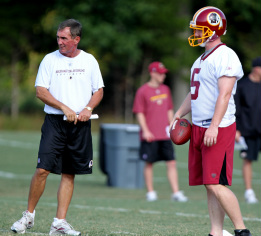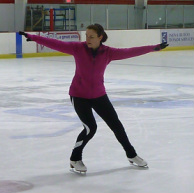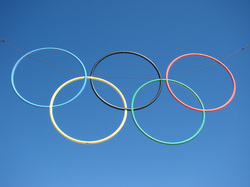 From Olympic speed skater Apolo Ohno's book, Zero Regrets: Be Greater Than Yesterday: I love this saying: Reach for the unreachable. When you reach for that branch in the tree and you can touch it - great. That's your goal. More: that's your destination. When it's your destination, that changes everything about how you approach the way. An Olympics, for instance--that might be four years away. There are innumerable ways to get there. But those four years are going to speed by amazingly fast. An Olympics lasts seventeen days. The cauldron goes out and it's over. I've arrived--or have I? Afterward, while I surely remember the Games themselves, I mostly recall the moments on the way. The strength you gain from that is remarkable. You've lived the experience--really lived it, fully. The process, not the outcome. That has to be what sustains us as athletes, elite or weekend warrior. Every time the Olympic Games come around, we hear announcers say things like, "This is it." "This is what it's all about." "This is the moment." "This is what they've trained for." But really what "This" is cannot just be the Olympic performance. "This" wouldn't be enough to sustain these athletes over four years or more of highs, lows, good training days, bad training days, missteps or injuries, honing skills, practice, practice, practice. What else besides the thought of "This" do I believe has to be there? Number One: Passion. Passion for the sport. Passion for the feelings sport participation brings. Number Two: Desire. Desire to be better than you ever thought you could be. Desire to see what your body and mind are capable of. Number Three: Enjoyment. There has to be a feeling of joy and fun, or why do it? Number Four: Reward. Rewards all along the way. One long-term goal of "This" and the thought of a possible reward of a medal of gold is not sustaining. There must be short-term goals and rewards to maintain motivation. Each and every small success should be celebrated. Number Five: Positive Attitude. See success, feel it, live it before it's even there. Feel like a winner every day. Number Six: Perspective. Realize when considering international competition, the odds are not exactly in any one person's favor. Pinning one's hopes and the idea of success or failure on one competition (considering there are always some variables outside of your control) is not just foolhardy, it is detrimental. Yes, it is an honor to represent one's country. Yes, the build-up to the Olympic Games is out-of-this-world, over-the-top phenomenal. But maintain perspective. Understand that if you are skilled and fortunate enough to get to that level, you cannot let the results define you as an athlete or as a person. See the bigger picture. Your Olympic experience began the first day of training. Every bit of blood, sweat and tears has been your Olympics all along. Know that, appreciate it, enjoy the whole experience of it. How does this relate to the weekend warrior? Every time you step onto the field, the rink, the court, the treadmill, the aerobics studio floor, you are training for your personal Olympics. Push yourself, enjoy yourself. Live the experience fully. That is what "This" is. Go for gold, whatever that may be for you. Here's to enjoying and living "This." Excerpt from: Ohno, A. (2010) Zero Regrets: Be Greater Than Yesterday. Atria Books.
2 Comments
 As soon as I reveal my occupation here in the DC area, I am inevitably asked, "Can you save the Redskins?" I wish it were that simple. I could just go to Redskins Park, meet with the team in their super-cool practice "bubble," flash a smile, say something magical and that would be the difference. But unfortunately, sport psychology is not magic. There is no one thing that anyone can do or say to completely transform a team in an instant. Working with a team is a process, and involves many facets. Could I ultimately save them? The good news is, I know in time I could make a difference, absolutely. How would I go about it? I have been reluctant to comment on the Redskins this season. It just seems there is so much going on beneath the surface, so much that is not being revealed, that it would be folly to attempt to say definitively what is needed and how to solve all of the issues. Having said that, here is how I see it. I see a team in turmoil, from both the top-down and the bottom-up. There is a lack of trust, a lack of team cohesion. There are egos involved; the almighty dollar and the business of it all are factors. There is a genuine and pervasive lack of respect between players and coaches, but also between players themselves. Many comments by players to the media appear laced with passive-aggression, daring us to read between the lines. It has been questioned whether there is even any talent on the team. Whether the play-calling has been sufficient. Whether players are playing to their strengths, their potential. The functioning of the team as a whole can only be considered as the sum of its parts. Each part must be in working order for the whole to achieve success. Individual efforts can be recognized and celebrated, but for a team sport, must be integrated appropriately into a team effort. Here is my plan of action: If I were able to attend practices at Redskins Park, I would look for several things. I would look for the existence of an effective practice and talent development environment. I would look for practice drills that are purposeful. The coaches would know why certain drills are useful, and this information would be relayed to the players. There would be learning, not just doing. The players would be encouraged to make decisions on the field.
I would observe the feedback coaches give. Is it well-timed, productive, effective? How do the players react to being coached? Do they encourage each other? Is there tension, or are there some light moments as well? What happens when mistakes are made? I would go to the training room, often where we find the heart of the support staff, the caregivers. Mental skills can help injured athletes rehabilitate more efficiently, and prepare them mentally to return to the field. This is vitally important to keeping them confident, motivated, and to avoid re-injury. Healthy athletes are key to consistent high-level production on the field. I would observe strength and conditioning training. Mental skills such as imagery, can produce huge increases in the training effect over physical training alone. Stronger players perform better. They are more resilient, confident. They can perform beyond their comfort zone. Much of what I do involves a lot of observation, listening, asking questions that help define issues and subsequent interventions. In talking with coaches, staff, players, yes, even Dan Snyder himself, I could formulate intentions for impact and appropriate interventions. With everyone's cooperation, commitment and dedication, we could, together, make a huge difference. So...Super Bowl win? While there can never be guarantees, the newly transformed Redskins would have one heck of a shot. 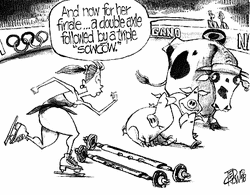 This week I wrote an article for coaches on this site about feedback. It addresses the basics, how to give feedback, how much to give, when to give it, how often. As I was writing I reflected upon my own experience with my figure skating coach, Pavel. I know I've written about him before, and his role in my saga from scared-to-death-of-ice to pretty decent skater with a dream or two. He is old school Eastern European, meaning compliments and encouraging words are few and far between. At times it is frustrating, because I wonder why I am paying him when he doesn't say too much. But actually, I know now I am paying him for one big reason--he's good. Really good. Whether he realizes it or not, his style of providing feedback is right in line with the research which says "less is more." He has an allowable "bandwidth" of movements within which I can perform. If I stray, he is on me immediately to correct what I have done. As I have improved, the bandwidth has narrowed. He allows fewer deviations from proper form than he did when I started. For example, when I was just starting, the focus was on balance and gliding. It didn't matter quite as much at that time whether my knees were bent as much as they should have been, only that they were not perfectly straight. My arms could be out to the side, not necessarily at the perfect angle, but mainly to help me learn how they could help me maintain balance and direction. Now, however, I have noticed that if my knees are not bent enough, I am corrected quickly. He has given me more specific detail about where my arms should be, which way I should be looking, keeping my shoulders square to the short wall. With each new skill, the bandwidth for that movement is widened at first, then narrowed appropriately. I complained to him once that he wasn't giving me enough detail about how to perform a movement, what I should be feeling, which muscles to tighten or relax. I am a "thinking person" and like to have as much detail as possible. He is opposed to thinking while skating, but will indulge me if I ask. That is the key. He is holding out, waiting for me to internalize the movement, to get the feel of it myself, to experiment, adjust, and finally learn how to do it all on my own. He notices the adjustments I am making. If he doesn't see any improvement, he will offer suggestions. But mostly, he waits until I ask, which is usually when I haven't been able to figure it out by myself. The learning taking place internally for me, is vital to my success in skating. So the other day at my lesson I mentioned to him how good he is, how his style matches what research suggests brings the most success. He smiled sheepishly and said, "I know this already." Well, he certainly knows it is reflected in his pairs skating team, who recently qualified for Sochi to compete for Estonia! His lessons with me, I'm sure, bring him back down to Earth and check any ego fluctuations. How many of us "know this already" about how to get the most out of our performance? When I talk with people about what I do as a sport psychology consultant, I get a lot of comments such as, "Right! That makes so much sense!" It should. It is, as my mentor from Penn State, Dr. David Collins, used to say, "Common sense not commonly applied." I help people discover what they already have at their disposal, their brilliant and strong minds, and offer ways they can apply mental skills to improve physical performance. We are constantly adjusting to one another, Pavel and I. He gives me a few more "very goods" to keep me happy, and I ask more pointed questions when I need them but not all the time. I am learning, internalizing, and that is the point. Pavel offers a successful learning environment. I apply the mental skills I have learned over the years, and it really helps me improve day to day. Oh, and I have fun, too.  What diehard Caps fan didn't hold his breath or shake her head in disbelief watching super goalie Braden Holtby allow 8 goals on 45 shots as this season started? Who can we count on now? What is going on?? But one person wasn't worried, and that was Holtby himself. Confidence intact, this student of the mental game of hockey understands exactly what is happening, and knows that in a short time he will be all he ever was and more. Even the greatest athletes can find room for improvement, though often are reluctant to make any tweaks or modifications, for fear it will interfere with their continued success. In fact, the changes, if applied, practiced consistently and internalized, will only enhance success in the long run. But the resistance persists for many. An athlete may look to a coach, veteran teammate or professional such as myself, for something they can do to improve, to get the edge over the competition. But if that "thing" is a change in style, position, anything the athlete has been doing for a long time, the walls can go up. It is true that initiating change means what has become a habit needs to be "unlearned" in favor of something new. Research has suggested for anything to become a habit it must be consistently applied for at least 6 weeks. Most athletes say, and rightly so, that they don't have 6 weeks to experiment with their performance. So timing is indeed a consideration. Ideally when an athlete is performing, he wants the movements to be automatic. He shouldn't have to think, just do it. When something new is in the mix, inevitably thinking goes along with it. "Wait, I have to do this instead of that." "Now how was I supposed to stand?" So we need to remove the conscious thought in favor of automatic responses. Holtby has been fortunate to be able to work with goaltending coach Olie Kolzig, himself an outstanding netminder, who has made some "tweaks" to Holtby's game--mainly footwork and positioning. Holtby says, "I think any changes you make that you haven't used your whole life take a little bit of work." And of his slow start, "It's just one of those things that when you start to struggle you go back to your old ways and get in even more trouble." Old ways, old habits, former automatic moves. The key is to make the new moves automatic, to completely replace, write over the old ones. Holtby is an amazing athlete, and fortunately also a willing student, eager to soak up expertise wherever he can find it. Obviously the new elements make sense to him; he has bought in to them. This is a very important point. You need to trust the source of the new information, believe that the changes will indeed work, and completely understand the reasons behind them. Now it is just a matter of making the new elements automatic. Holtby gets it, and will be that much better for embracing the changes. There is no need to fear change in your game if you plan for it, devote yourself to practice it and internalize it to make it automatic. You'll know when you're there, because suddenly there will be no "old ways" to fall back on in a critical moment. I like the saying, "Don't practice until you get it right. Practice until you can't get it wrong." Pure automatic. 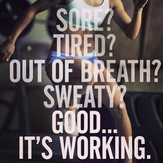 My gym has done the unthinkable. It has challenged us, the members, to go where we never dared before. We've seen the infomercials for the DVD, frowned or cringed at the carnage on the screen and promptly turned the channel, shaking our heads and thinking, "those people are insane. If I did that DVD, I'd definitely have a finger on the pause button. Often." Now suddenly we are being beckoned, dared to be "those people." Like rubberneckers at the scene of a bad accident, an overflow crowd of us had to check it out. Up close. For no other reason than to be able to tell the tale, "Guess what I saw today!" Trouble was, getting close meant having to participate. I quickly found myself justifying it in my head--"Couldn't be that bad. They wouldn't offer it here if it was really that bad. Right?" The music began. Pleasant enough. The instructor, I think her name was Sergeant something; at least that's what I came to call her, flashed a big smile and invited us to march with her. "This is your workout," she entreated us in a sing-song voice. "Go at your pace. But push yourself, even just a little, and you'll get something out of the class." No problem. "Today we'll focus on form," Sergeant Sweet continued, "Use proper form even if it's slow. Just have fun." Not so bad at all. This is going to be fun, she just said that! Happily marching, several of my fellow rubberneckers and I chatted excitedly about how we had been so worried. Silly of us. Then suddenly, as if a switch had been flipped from someplace very far below the Earth, Sergeant Sweet began to change. Not a subtle change, but a head-turning-360-degrees change. "FASTER! You need to PUSH IT! I do NOT want any of you coming to me after class saying you didn't even SWEAT! DON'T waste your time! Come on! Show me MORE! Jump! JUMP!" Our chatter ended. The fact that oxygen was now at a premium was probably a factor in that. 30 seconds of this move, 30 seconds of that move, suck in air, towel off the sweat. At last it was over. Oh, that was just the warm-up. "Let's GO! MOVE! MOVE! I'm watching YOU!" Sergeant Torture bellowed. During the precious few 30-second breaks, no one dared even glance at one another, lest we be held as an accessory to what was happening. The prosecutor would no doubt ask, "Why did you do nothing to stop it?" I'll plead lack of oxygen, extreme dehydration. After 50 minutes, we were mere shells of our former selves. Broken and really really sweaty, we stood stunned, realizing the music had stopped. Sergeant Sweet was back, the doors were open--we were free to go! Well, once we could actually move, that is. We shrieked at our good fortune. We survived! "So what did you think? Did you love Insanity?" Sergeant Sweet asked. One woman replied, "I think you should change the name of the class to 'Don't Go'!" We all laughed nervously. Please, Sarge, don't hold that against us next time. Did I say next time? Heck yeah, we're coming back. We feel invincible! We have been pushed to the brink and survived! We are still a little out-of-it, oxygen deprived, dehydrated, beaten and nearly broken. OK, not thinking straight, either. And yet, we all have an unspoken agreement to meet here again next week. To endure together. Share our misery. Enjoy our company, no matter how insane. Better than suffering alone to a DVD. And yet...do they make a "pause" button for real-life? I think I'll look into that before next week. 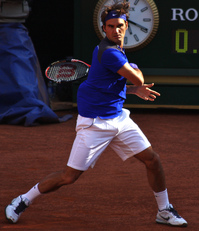 Very few athletes reach the pinnacle of their sport. Years of hard work, sacrifice and conditioning can and do pay off for some. On top of their game, they sail through, confident and seemingly unbeatable. Until the day comes that they start to notice a little slip here or there. A match that was a little more difficult to win. A lost step or two. Physical or mental mistakes that never happened before. It's a strange feeling for these athletes. They are often ill-equipped to respond. Their focus becomes to battle back to the top, to grasp whatever they can to keep from slipping. The joy they felt when playing may be slipping as well. Consider tennis elite Roger Federer, 32, who after a stellar career has been stumbling a bit of late. After enjoying so many years of success and intimidating opponents with his mere presence on the court, he has found himself slipping in the ranks, losing matches to lower-ranked players. Struggling to find a way to give his play a boost, he even tried a bigger racket, something his game had never required before. It didn't work. It may have actually caused his mental game to suffer as well. Often tossing a new element into the mix can cause chaos. Suddenly his play was not as automatic. He needed to essentially start over and reestablish his routine, develop motor skills and coordination to deal with the new racket. (He has since gone back to "old faithful.") He was grasping, trying to find what was wrong. He went for a physical change first, when maybe it was his mental game that could have used the tweaking. A full assessment of both his mental and physical game could yield appropriate areas that may need adjustment to help him get back to form. But all he knew was that something had to change to avoid the trajectory he was on. It's hard to see or admit when the years start to catch up. But clear focus and attention is necessary. If you are still passionate about the game no matter the outcome, keep playing. If losing your status is important, however, consider hanging up your competition hat. Long before his retirement at age 30, Andy Roddick, for example, decided that he would retire the moment his ranking fell to below a certain point. While he likely felt the same anxiety upon realizing he was falling, he at least had thought it all through. He had a plan. This is a good lesson for any athlete. While it is very hard to even consider retirement while riding the peak of athletic success, it will be so helpful in the long run when--yes, when--that time arrives. Federer is a strong competitor, and seems to now be formulating such a plan. "Every match gives me more information to tell me if I'm on the right path or not," he says. "I'm a strong believer that I am on the right path now. I just need to make sure that mentally I stay cool about it." He needs to find a way to stay confident and to keep believing in himself, in a sport where the mental game can make the difference between a win and a loss. When an opponent steps on the court and sees that you know how good you are, senses that you feel invincible, unbeatable, you have the edge immediately. I think Federer can pull this off. As long as he can show he still feels he can dominate, he'll be fine. He will definitely benefit from having a clear, objective plan for his tennis future, which will reduce his anxiety and his panicked attempt to grasp onto things that may do more harm than good to his game. The time will come when he can comfortably pull away from the competitive arena, knowing he gave his all, made his mark, and bowed out with dignity.  I recently started a profile on LinkedIn. I hadn't done it earlier because I guess I didn't quite get it. You make all of these "connections," hoping for--what? It's not like Facebook where these people are your friends and you post pictures of your adorable kid's latest exploits or your vacation to the Grand Canyon. It's really more of an online resume crossed with an opportunity to proudly display work accomplishments and subtly put feelers out for future employment opportunities. It's our "other" persona, beyond family life. It's that identity that most of us use to define ourselves. Go to any Happy Hour and you will hear over and over, "So what do you do?" Who we are and what we do are often one and the same in our minds. I was hesitant for a long time to put myself out there on LinkedIn. Probably because before Personal Best Sports, I couldn't really define who I was--at least not through a particular profession. But now, I'm in. And it's actually been fun and exciting. Who accepted my invitation today? My network grows, people all over the world view my profile and find me interesting or worthy of potential assistance enough to "Accept." It got me thinking about the power of connection. And it is a powerful thing. Humans are social creatures. We thrive with company. We like to interact and share. We are boosted when we receive praise, as well as when we give it. Sports enables us to have connections. We are fans who celebrate together the thrill of victory, or join in suffering the agony of defeat. We are teammates who share the struggles of vigorous practice drills and swell with pride holding the trophies. It's all better when we do it together. For any endeavor to be successful, a key component is connection. Take starting a fitness or diet program, for example. Numerous studies have shown the people who enjoy the most success have someone to work out with, or to be accountable to. Knowing someone is counting on us makes us more determined to continue. "Going public" by sharing our goals with someone almost guarantees adherence to the plan. Connections can also breed healthy competition. LinkedIn is a constant reminder of what great accomplishments my network has achieved. It makes me determined to keep up my end of the bargain. I will not let my network down. I will let them know I am contributing to our collective strength as well. Strength in numbers, right? Silly? Maybe, but think about it. Have you ever felt any motivation to produce for others? Colleagues, bosses, teammates, coaches? Where did that come from? Your singular desire to do your best? Or maybe in some small way you wanted to prove something to others? So what is my take-home message? First, consider your personal "profile." Who are you now? What are your skills, abilities, accomplishments? Go beyond work. Get personal. Raised three healthy kids? Organized a family reunion? Built a tree house? Lost 50 pounds? Who helped you get there? Can you pay it forward somehow? Where do you want to be? What do you want to be able to add to your profile in the future? Second, get linked in. Not capital "L" linked, necessarily. Just make connections that can help you achieve the goals you desire. Connections can be professionals who would be a source of information or assistance for you. Family or friends with whom you share your goals and who keep you accountable. Or friends, colleagues, teammates, who are willing to actually get in the trenches with you. Anything you put your mind to is possible. Remember that. And more minds can make the journey to possible that much easier. Invite connection. Accept invitations to connect. You'll be amazed by what you can accomplish. I was invited by Huffington Post Live to be on a panel of experts for a chat about the challenges faced by female athletes during and after pregnancy. There was much more I wanted to add! Will do on a future blog or article...
Watch the video chat--click here! "...sometime, when the team is up against it -- and the We all love the poignant, heartfelt, go-get-'em speeches coaches give when the going is tough. How's this one from University of Kansas football coach Charlie Weis, when recruiting players to his less-than-stellar Jayhawks program?
"Have you looked at that pile of crap out there? Have you taken a look at that? So if you don't think you can play here, where do you think you can play?...You've seen it, right? Unfortunately, so have I." Not exactly Braveheart leading his men into battle. Would you follow this guy anywhere? A coach should be a leader, a champion of his team. Even a team whose record is 1-11. We are intelligent people. We know it takes a lot of individual effort put together to make a team what it is. The indisputable leader (and ultimately responsible party) is the coach. Under the best of circumstances, it's an easy job. The best players, the best staff, and you have an epic season. But anything can happen. Storm clouds can appear and the picnic is rained out. But the leader cannot be a reflection of the weather. He or she must be a constant, driving force. When it's sunny, he is enjoying the rays. When it rains, she doesn't pack it in, she brings an umbrella. For Coach Weis to denigrate his team this way, he is effectively separating himself from them, when in actuality, he is the head of this creature. Without him, the body crumbles. Where will the team find its direction? How can Weis expect to receive the respect of his players when he cannot show any? To me, Coach Weis has done less to show the ineptitude of his team, and more to show his own disloyalty and dysfunction as a leader. On a recent trip, I struck up a conversation with a fellow traveler. He mentioned that he coaches his son's little league team. I told him a little about what I do, and he suggested that I include more focus on coaches. I told him I do work with coaches, helping them to design effective skill development environments for their athletes, motivate and support their athletes through the ups and downs of sport competition and preparation, and help them become strong, confident people. He said, "But remember, coaches are people, too." I asked him to elaborate. "Well, athletes get anxious or unmotivated or angry when they don't do well, but so do coaches. Who motivated the coaches or helps them handle their anxiety or anger or stress?" He used the examples of Indiana chair-tossing legend Bobby Knight and more recently Mike Rice, Rutgers' infamous abusive coach. "We might condemn their overreaction," he said, "but maybe they would benefit from some coaching themselves." I pondered this. Many coach training or education courses focus more on the athletes and touch only lightly on things like the values a coach should possess (see Coaching article "Developing Your Coaching Vision"), or how to recognize and neutralize feelings that may be negative and result in overt negative behavior, loss of confidence, even burnout. The key to recognizing these is having a strong self-awareness.
Coaches, like any other people, have needs, feelings, wants. But too often they are taught to put the needs of their athletes first. This can lead to coaches neglecting their own needs. When this happens, their self-confidence and feelings of worth can suffer. They may feel anxious, guilty, sad, or even ashamed at times. The negative feelings can then manifest in behaviors such as poor communication, overworking, giving up or impulsiveness. Self-awareness can help the coach recognize these feelings. Once they are recognized, they can be handled, reframed, replaced with positive feelings to increase motivation, commitment and desire once again. The coach's effectiveness is directly related to the management of distractions which result in negative or destructive feelings or behaviors. The distractions for coaches, as for anyone, come from many sources--family, athletes, colleagues, principals or administrators, team parents. Distractions cannot always be avoided. But they can be mitigated or "headed off at the pass." Self-awareness and the ability to handle distractions when they arise are things that can be taught using mental techniques. With consistent practice, coaches can be more effective and feel more satisfied with their own performance. |
"Even if you are on the right track, you will get run over if you just sit there." Personal Best SportsThe sports world is filled with stories of perseverance, failure and success, personal struggles and public triumph. Each story provides insight into the mental side of sport and activity. Archives
March 2016
Categories
All
|

